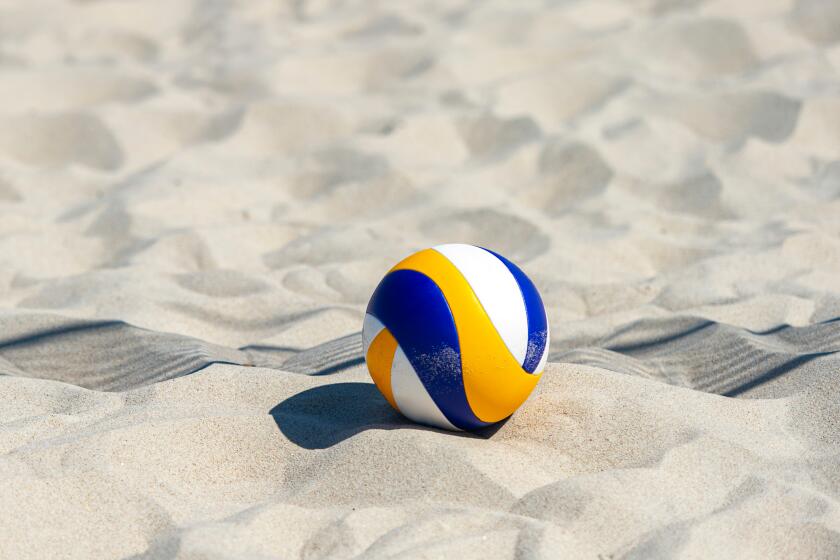COMMENTARY : Home-Court Edge Too Often Tips NBA Playoffs Off Balance
- Share via
Know what I’d like to see? The NBA taking a tip from tennis. It could do wonders for its playoff season.
In spite of the people who muddy its name, tennis is a scrupulously honorable sport. Tennis acknowledges that the largest advantage in its game is with the server, and so it requires the winner of a set to have beaten his opponent when the opponent is serving.
Similarly, the most advantageous position in basketball is for a team to be on its home floor. Consider the teams that are playing for the NBA championship in the series that began Tuesday night at Detroit.
The Pistons and Portland Trail Blazers were 9-0 at home in the playoffs, but both were under .500 on the road. En route to the NBA Finals, each survived a seven-game series largely on the strength of its home-court advantage. For Detroit, that edge showed in the Eastern Conference finals, when the Pistons went 4-0 at the Palace in Auburn Hills, Mich., and 0-3 at Chicago Stadium. Similarly, against San Antonio in the Western semifinals, the Trail Blazers were 4-0 at home and 0-3 on the road.
Tuesday night, the Pistons won the finals opener on their home floor.
This spring, home-court advantage was the most important ingredient in four of five playoff series that went the maximum: Besides the home-court blessings of the Trail Blazers and Pistons, New York and Philadelphia advanced out of the first round by winning only at home. Furthermore, only Phoenix had any luck among the teams without a home-court advantage, ousting Utah and the Lakers before succumbing to the Trail Blazers’ home floor and Kevin Johnson’s sore hamstring.
All told, home teams are 55-13 in the playoffs. And these contests are best on best. Nobody’s getting fat off the Kings or Clippers any more.
The finals have gone to the team with the greater number of home games eight times in 12 years, including the last four. If the trend holds--and there’s no compelling reason to believe it won’t, given Detroit’s 17-1 playoff record at the Palace the last two seasons--the championship was decided when the Pistons won the scheduling tie-breaker with their slightly superior conference record.
What causes home-edge disparity is beyond dissection. Some subscribe to the IN-YOUR-OWN-BED theory, a doctrine encompassing everything that has to do with undisrupted routines. But that doesn’t explain how veteran teams, which ought to have developed road-trip routines, can be thoroughly unwound by away games.
Others point to the enthusiastic intimacy of NBA crowds, suggesting that the home team benefits from the effect of mob intimidation on visitors and officials alike. Maybe, but does that reveal how the Pistons could win Games 5 and 7 of the Eastern finals (at home) by 14 and 19 points and lose Game 6 (in Chicago) by 18? Not a chance. After all, it’s not Earl Strom’s league.
Anyway, when I am made Supreme Being of Basketball, the first thing I intend to fix is the playoffs. Home-court advantage will remain a useful tool, but it will no longer be the preemptive strike weapon it is today.
First of all, given the robust financial health of the league, we’ll do away with the current 2-3-2 finals format and go back to the 2-2-1-1-1 arrangement. After all, it used to be good enough for the finals (until the league, stricken by early ‘80s poverty, got up tight about consuming all that jet fuel), and it remains good enough for intra-conference playoffs.
If someday that means jetting back and forth between Sacramento and Orlando a couple of extra times to settle the league crown, so be it.
But here’s the czar’s historic wrinkle: In the league and conference finals, if at the conclusion of any Game 6 neither team has won on the road, Game 7 would convene at a neutral site in a predetermined NBA city. That way we’d begin to determine champions who have something going for them beyond home cookin’.
If, on the other hand, each team has managed to win at least once on the opponent’s floor, the rotation would continue as usual, and the team with the home-court advantage would be the host for Game 7. The czar believes any team that “breaks serve,” so to speak, and then cannot hold it does not deserve having the league intervene on its behalf.
The czar would maintain the current rotation in the best-of-seven conference semifinals and the best-of-five first round. The regular season must stand for something, but two rounds of all-important home-court advantage seems about enough.
More to Read
Go beyond the scoreboard
Get the latest on L.A.'s teams in the daily Sports Report newsletter.
You may occasionally receive promotional content from the Los Angeles Times.










